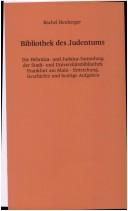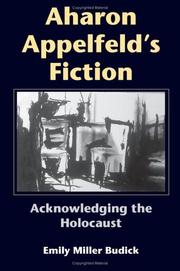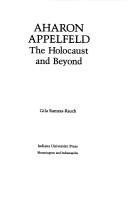| Listing 1 - 10 of 10 |
Sort by
|

ISBN: 3465028635 Year: 1996 Publisher: Frankfurt am Main Klostermann
Abstract | Keywords | Export | Availability | Bookmark
 Loading...
Loading...Choose an application
- Reference Manager
- EndNote
- RefWorks (Direct export to RefWorks)
Jewish libraries
---
#BIBC:ruil
Book
ISBN: 1283875241 1611680158 9781611680157 158465967X 9781584659679 1584659688 9781584659686 Year: 2011 Publisher: Waltham, Mass. Brandeis University Press
Abstract | Keywords | Export | Availability | Bookmark
 Loading...
Loading...Choose an application
- Reference Manager
- EndNote
- RefWorks (Direct export to RefWorks)
A provocative look at the centrality of desire for ""the Land"" among early settlers in pre-state Israel
Hebrew language --- Pioneers --- Halutzim --- Zionism. --- Jewish language --- Jews --- Semitic languages, Northwest --- First settlers --- Settlers, First --- Persons --- Frontier and pioneer life --- Chalutzim --- Ḥalutsim --- Zionist movement --- Jewish nationalism --- History. --- Languages --- Zionism --- Politics and government --- Restoration --- Gordon, Aaron David, --- Gordon, Aharon David, --- Gordon, A. D., --- גארדאן, אהרן דוד בן יחיאל מיכל --- גארדאן, אהרן דוד בן יחיאל מיכל, --- גארדאן, אהרן דוד, --- גארדאן, א.ד --- גורדון, אהרון דוד --- גורדון, אהרון דוד, --- גורדון, אהרן דוד --- גורדון, אהרן דוד, --- גורדון, א. ד. --- גורדון, א. ד., --- Palestine --- Holy Land --- History --- Emigration and immigration

ISBN: 0253111064 9780253111067 0253344921 9780253344922 1282071351 9781282071353 9786612071355 6612071354 Year: 2005 Publisher: Bloomington Indiana University Press
Abstract | Keywords | Export | Availability | Bookmark
 Loading...
Loading...Choose an application
- Reference Manager
- EndNote
- RefWorks (Direct export to RefWorks)
How can a fictional text adequately or meaningfully represent the events of the Holocaust? Drawing on philosopher Stanley Cavell's ideas about ""acknowledgment"" as a respectful attentiveness to the world, Emily Miller Budick develops a penetrating philosophical analysis of major works by internationally prominent Israeli writer Aharon Appelfeld. Through sensitive discussions of the novels Badenheim 1939, The Iron Tracks, The Age of Wonders, and Tzili, and the autobiographical work The Story of My Life
Holocaust, Jewish (1939-1945), in literature. --- Appelfeld, Aron --- Apelfeld, A. --- Appelfeld, A. --- Appelfeld, Aarón --- Appelfeld, Aharon --- Applefeld, Aaron --- Appelʹfelʹd, Akharon --- Аппельфельд, Ахарон --- Аппельфельд, Аарон --- אפלפלד, א. --- אפלפלד, אהרן --- אפלפלד, אהרון --- Criticism and interpretation.
Book
ISBN: 1618111140 9781618111142 1934843032 9781934843031 Year: 2008 Publisher: Boston, MA
Abstract | Keywords | Export | Availability | Bookmark
 Loading...
Loading...Choose an application
- Reference Manager
- EndNote
- RefWorks (Direct export to RefWorks)
The Boldness of a Halakhist analyzes the writings of Rabbi Yechiel Mechel Halevi Epstein (1829-1908), author of the Arukh Hashulkhan, a bold and unusual approach to Jewish law. Based primarily on the original text of Rabbi Epstein's legal codes and homilies, this work covers topics such as women, modernity, customs, and secular studies. It analyzes the rabbi's approach to Jewish law and Jewish life, designed to promote the spiritual welfare of Jews under the pressures of growing secularization and Russification. Although based upon the principles of the traditional judicial process, the rabbi's rulings demonstrate a profound understanding of the contemporary social and historical reality facing the Jews of Russia at the turn of the century.
Jewish law. --- Biblical law --- Civil law (Jewish law) --- Halacha --- Halakha --- Halakhah --- Hebrew law --- Jews --- Law, Hebrew --- Law, Jewish --- Law, Mosaic --- Law in the Bible --- Mosaic law --- Torah law --- Law, Semitic --- Commandments (Judaism) --- Law --- Epstein, Jehiel Michael ben Aaron Isaac, --- Epstein, Jechiel Michel, --- Epshṭain, Yeḥiʼel Mikhl ben Aharon Yitsḥaḳ, --- Epsṭain, Yeḥiʼel Mikhl ben Aharon Yitsḥaḳ, --- Epshṭain, Yeḥiʼel Mikhal, --- Epshṭeyn, Yeḥiʼel Mikhl, --- Epshṭeyn, Yeḥiʼel Mikhal, --- Epstein, Yechiel Mechel Halevi, --- Epstein, Yechiel Michel, --- Arukh Hashulhan, --- Aruch ha-Shulchan, --- עפשטײן, יחיאל מיכל בן אהרן יצחק, --- עפשטיין, יחיאל מיכל --- עפשטיין, יחיאל מיכל בן אהרן, --- עפשטיין, יחיאל מיכל בן אהרן יצחק, --- עפשטיין, יחיאל מיכל, --- עפשטיין, יחיאל מיכל, הלוי, --- Teachings.
Book
ISBN: 9789004498679 9789004499379 9004498672 9004499377 Year: 2022 Publisher: Leiden Brill
Abstract | Keywords | Export | Availability | Bookmark
 Loading...
Loading...Choose an application
- Reference Manager
- EndNote
- RefWorks (Direct export to RefWorks)
"The study tracks the origins of the Biblical Levitism. It only emerged in the late pre-exilic period as a Judean innovation of the tribal concept. After 722, traditions about Jacob's son Levi were used in Judah to form a group identity of officials and literal elites. Moses and Aaron, as officials of the God of Israel, became protagonists of this group. Therefore, the priests at the central shrine were also integrated as part of the officials, so that Deuteronomy, for example, speaks of Levitical priests. In the post-exilic period, a number of professions and groups were subordinated to the priesthood under the designation "Levites" as a kind of temple office. In the process, a professionalisation of the cultic sector and a radical separation of cultic and non-cultic areas and activities took place. In this, the Levites acted on behalf of the people and represented them in the non-cultic areas of the temple."--
Biblical Interpretations --- Biblical Studies --- Priests, Jewish --- Levites --- 221.08 --- Jews --- 221.08 Oud Testament: bijbelse theologie --- Oud Testament: bijbelse theologie --- Biblical teaching --- Priests --- Moses --- Aaron --- Aaron, --- Aron --- אהרן --- Aharon --- Hārūn b. ʻImrān --- هارون --- Hārūn --- Аарон --- Ααρών --- 아론 --- Aronne --- Aroni --- Ārons --- Aaronas --- アロン --- Aarão --- Arão --- Арон --- Aaroona --- אהרן, --- Aharon, --- Áárọ́nì --- 亞倫 --- Yalun --- Ya lun --- Moïse --- Moiseĭ --- Moisés --- Mosè --- Mosheh --- Mosheh, --- Mosis --- Moyshe, --- Mózes --- Mūsá --- Nabī Mūsá --- משה --- משה,

ISBN: 0585334366 9780585334363 0253348315 9780253348319 Year: 1994 Publisher: Bloomington : Indiana University Press,
Abstract | Keywords | Export | Availability | Bookmark
 Loading...
Loading...Choose an application
- Reference Manager
- EndNote
- RefWorks (Direct export to RefWorks)
The contemporary Hebrew novelist Aharon Appelfeld is one of the foremost chroniclers of the impact of the Holocaust on the human psyche. His fiction weaves sensitive and disturbing tales about individuals in the pre- and post-Holocaust worlds. In the first book devoted entirely to Appelfeld's work, Gila Ramras-Rauch explores his life, his shattered universe, and the development of his unique esthetic. A book-by-book analysis of his entire body of fiction - short stories, novellas, and novels from the early 1960s to the early 1990s, including such works as Smoke; Tzili, the Story of a Life; Badenheim 1939; and Katerina - provides a perceptive guide to Appelfeld's enchanted yet terrifying fictional world.
Holocaust, Jewish (1939-1945), in literature. --- Holocaust, Jewish (1939-1945), in literature --- Languages & Literatures --- Middle Eastern Languages & Literatures --- Appelfeld, Aron --- Apelfeld, Aharon --- Apelfeld, A. --- Appelfeld, A. --- Appelfeld, Aarón --- Appelfeld, Aharon --- Applefeld, Aaron --- Appelʹfelʹd, Akharon --- Аппельфельд, Ахарон --- Аппельфельд, Аарон --- אפלפלד, א. --- אפלפלד, אהרן --- אפלפלד, אהרון --- Criticism and interpretation. --- Criticism and interpretation --- Holocaust [Jewish ] (1939-1945) in literature
Book
ISBN: 1282603043 9786612603044 9047442458 9789047442455 9789004170407 9004170405 9789004172524 9004172521 9789004172531 900417253X Year: 2009 Publisher: Leiden Boston Brill
Abstract | Keywords | Export | Availability | Bookmark
 Loading...
Loading...Choose an application
- Reference Manager
- EndNote
- RefWorks (Direct export to RefWorks)
Scholarship on the formation of the Atlantic world through contributions from Europe, Africa and the Americas has grown in recent decades. The results offer new understandings of the transformations in ethnic and religious identity faced by peoples from all the surrounding continents. Long used by scholars of Jewish studies, records from the Spanish and Portuguese Inquisitions have become an important source for historians of Africans and Amerindians in the Iberian colonial orbit. Using these and other materials, this book explores race, religion and politics among three newly and incompletely Christianized groups in the seventeenth century: Judeoconversos, Afroiberians and Amerindians. This fresh cross-cultural analysis brings these differing trajectories into dialogue.
Metaalindustrie.
---
Christentum.
---
Ethnische Identität.
---
Konversion
Book
ISBN: 9780253024091 0253024099 9780253024015 0253024013 Year: 2016 Publisher: Bloomington, Indiana ; Indianapolis, [Indiana] : Indiana University Press,
Abstract | Keywords | Export | Availability | Bookmark
 Loading...
Loading...Choose an application
- Reference Manager
- EndNote
- RefWorks (Direct export to RefWorks)
Blood and Dreams looks at three autobiographical texts written by individuals caught within the matrix of inquisitorial persecution, expanding global trade and crypto-Jewish activity in the early modern period. Luis de Carvajal, el mozo (1567-1596), also known as Joseph Lumbroso moved from Spain to Mexico when he was a teenager in 1580 and began writing his spiritual autobiography after his first inquisitorial trial in 1589. The Portuguese merchant Antonio de Montezinos (1604-1647), recounts his life-changing encounter with the lost tribe of Reuben living in the northern Andes. His account dates to 1644 but was only published in 1650 as part of Menasseh ben Israel's treatise on the fate of the Lost Tribes, Mikveh Israel/ Esperanza de Israel. Manuel Cardoso de Macedo (1585-1652) was an Azorean Old Christian who first embraced Calvinism before leaving Christianity behind and converting to Judaism. He wrote his spiritual autobiography, La Vida del buenaventurado Abraham Pelengrino Guer while living as a Jew in Amsterdam at some point after the 1620's. "Identity, family, and community unite three autobiographical texts by New World Crypto-Jews, or descendants of Jews who were forced to convert to Christianity in 17th-century Iberia and Spanish America. Ronnie Perelis presents the fascinating stories of three men who were caught within the matrix of inquisitorial persecution, expanding global trade, and the network of Crypto-Jewish activity. Each text, translated here for the first time, reflects the unique experiences of the author and illuminates their shared, deeply rooted attachment to Iberian culture, their Atlantic peregrinations, and their hunger for spiritual enlightenment. Through these writings, Perelis focuses on the social history of transatlantic travel, the economies of trade that linked Europe to the Americas, and the physical and spiritual journeys that injected broader religious and cultural concerns into this complex historical moment"--
Crypto-Jews --- Anusim --- Converts --- Jews --- Montezinos, Antonio de, --- Mello, João Manuel Cardoso de. --- Carvajal, Luis de, --- Cardoso de Mello, João Manuel --- De Mello, João Manuel Cardoso --- Melo, João Manuel Cardoso de --- Mozo, --- Lumbroso, Joseph, --- Lumbroso, José, --- De Montezinos, Antonio, --- Levi, Aaron, --- Levi, Aharon, --- Monterinos, Antonie, --- אהרן,
Book
ISBN: 9065544712 Year: 2000 Publisher: Groningen Historische uitgeverij
Abstract | Keywords | Export | Availability | Bookmark
 Loading...
Loading...Choose an application
- Reference Manager
- EndNote
- RefWorks (Direct export to RefWorks)
296 <492> --- Holocaust, Jewish ( 1939-1945) --- -Jewish councils --- -Jews --- -Hebrews --- Israelites --- Jewish people --- Jewry --- Judaic people --- Judaists --- Ethnology --- Religious adherents --- Semites --- Judaism --- Councils, Jewish --- Jewish councils and synods --- Jewish synods --- Judenrat --- Judenräte --- Judenrats --- Synods, Jewish --- Jews --- Judaïsme. Jodendom--Nederland --- History --- Politics and government --- Cohen, David --- הכהן, דוד --- הכהן, דוד בן אהרן --- כהן, דוד --- Kohen, Daṿid --- -Judaïsme. Jodendom--Nederland --- Holocaust, Jewish (1939-1945) --- Jewish councils --- Cohen, David, --- Netherlands --- Biography --- Intellectuals --- Zionists --- Zionism --- 20th century --- Jewish scholars
Book
ISBN: 9789042930940 9042930942 Year: 2017 Volume: 76 Publisher: Leuven Peeters
Abstract | Keywords | Export | Availability | Bookmark
 Loading...
Loading...Choose an application
- Reference Manager
- EndNote
- RefWorks (Direct export to RefWorks)
This book provides the first full-length literary and form-critical study of Aaron, a central yet long-neglected biblical figure. Using a range of methodologies, it carefully examines key Pentateuchal texts which present Aaron in multiple ways.
221-05 --- 221 --- 221 Bible: Ancien Testament --- 221 Bijbel: Oud Testament --- Bible: Ancien Testament --- Bijbel: Oud Testament --- 221-05 Personen in het Oude Testament --- Personen in het Oude Testament --- Aaron --- Bible. --- Chumash --- Five Books of Moses --- Ḥamishah ḥumshe Torah --- Ḥumash --- Kitāb-i Muqqadas --- Mose Ogyŏng (Book of the Old Testament) --- Pentateuch --- Pi︠a︡toknizhīe Moiseevo --- Sefer Ḥamishah ḥumshe Torah --- Tawrāh --- Torà (Pentateuch) --- Torah (Pentateuch) --- Tʻoris xutʻcigneuli --- Ureta --- תורה --- Haftarot --- Criticism, interpretation, etc. --- Ancien Testament --- Antico Testamento --- Bibel. Altes Testament --- Bible hébraïque --- Bible. Ancien Testament --- Bible. Antico Testamento --- Bible. Hebrew Bible --- Bible. Hebrew Scriptures --- Bible. Kitve-kodesh --- Bible. Mikra --- Bible. O.T. --- Bible. Old Testament --- Bible. Palaia Diatheke --- Bible. Pentateuch, Prophets, and Hagiographa --- Bible. Sean-Tiomna --- Bible. Stary Testament --- Bible. Tanakh --- Bible. Tawrat --- Bible. Torah, Nevi'im u-Khetuvim --- Bible. Torah, Nevi'im, Ketuvim --- Bible. Velho Testamento --- Bijbel [Hebreeuwse ] --- Bijbel. Oud Testament --- Hebreeuwse bijbel --- Hebrew Bible --- Hebrew Scriptures --- Hébraïque [Bible ] --- Kitve-kodesh --- Mikra --- Old Testament --- Oud Testament --- Palaia Diatheke --- Pentateuch, Prophets, and Hagiographa --- Sean-Tiomna --- Stary Testament --- Tanakh --- Tawrat --- Torah, Nevi'im u-Khetuvim --- Torah, Nevi'im, Ketuvim --- Velho Testamento --- Aaron, --- Aron --- אהרן --- Aharon --- Hārūn b. ʻImrān --- هارون --- Hārūn --- Аарон --- Ααρών --- 아론 --- Aronne --- Aroni --- Ārons --- Aaronas --- アロン --- Aarão --- Arão --- Арон --- Aaroona --- אהרן, --- Aharon, --- Áárọ́nì --- 亞倫 --- Yalun --- Ya lun --- Exegese Oude Testament --- Bijbelcommentaar --- Bijbelse theologie
| Listing 1 - 10 of 10 |
Sort by
|

 Search
Search Feedback
Feedback About UniCat
About UniCat  Help
Help News
News